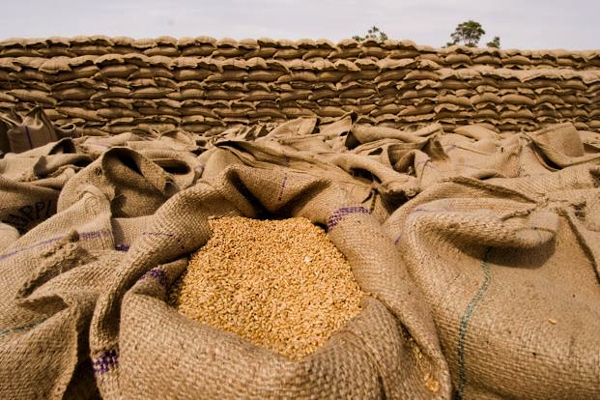India has proposed to help the World Food Programme (WFP) replenish its foodgrain stock from overflowing state-owned granaries to assist the organization’s efforts in providing food to the most vulnerable global population amid the covid-19 crisis.
The draft proposal was in reply to an appeal by member countries of the World Trade Organization (WTO) to lift the ban on shipment of rice and wheat to many countries, in view of the massive humanitarian crisis.
The challenges faced by WFP due to export restrictions on foodgrain purchased for non-commercial humanitarian efforts were being discussed by WTO members since 2011. New Delhi had initially opposed a fresh proposal to remove the export restrictions on foodgrain recently moved by a group of countries led by Singapore, fearing procurement of large volumes of food may have inflationary effects on India that can negatively affect households, particularly the poorest ones.
“Since the objective of this draft decision is to make food-aid available to the most vulnerable people in times of a crisis, will this decision also encompass the provision of exports to the WFP from the PSH (public stockholding) of a supplying member?” India asked at the recently concluded General Council meeting of the WTO. “This can happen either in the scenario where the WFP is willing to tap the PSH stocks of a supplying member, or, when the supplying member can part with some of their PSH stock for humanitarian procurement by the WFP without jeopardizing their own domestic food security. Food security is the final objective, and it should not matter which stock it is coming out of as long as the exports are for a non-commercial, humanitarian purpose.”
In recent years, the government’s record procurement has led to burgeoning central pool stocks at 2.5 times the existing buffer norms. Till September, for instance, Food Corporation of India had central stocks of 22.2 million metric tonnes of rice and 47.8 million metric tonnes of wheat.
“Given the food security objective of the draft decision, we would like to understand if this decision of not imposing export restriction includes bilateral, non-commercial, humanitarian food assistance provided by a supplying country from its PSH stocks to needy countries or regions out of PSH stocks,” India added.
The World Food Programme (WFP) is the leading humanitarian organization delivering food assistance in emergencies to save lives and working with communities to improve nutrition, build resilience and change lives for the better. Each year, WFP assists almost 100 million people in more than 80 countries across Africa, Asia, Latin America and the Middle-East.
WFP has said that covid-19 has adversely impacted its supply chain due to measures implemented to reduce spread of covid-19, in particular at key cargo entry points such as border crossings and ports. “While the number of countries imposing export restrictions was limited compared to previous crisis, local restrictions eg, on rice, were implemented in some regions, causing interruptions in the form of cancelled contracts and higher prices as procurement source needed to change. The proposal promoted by Singapore to prohibit export restrictions on foodstuffs purchased by WFP for humanitarian purposes will not only be beneficial for WFP’s operations, but will also help accelerating the achievement of SDG 2 (Sustainable Development Goals) towards Zero Hunger,” it added.
Source: LiveMint
You may also like
-
India Suspends Tourist Visas Issued to Chinese Nationals: IATA
-
UK PM Boris Johnson Signals Visa Flexibility with India to Win Trade Deal. Key Highlights
-
Thailand Gets India-Made Covid Vaccines Under Quad Initiative
-
Chief of Naval Staff (CNS), Admiral R Hari Kumar Visited Maldives
-
India & Finland Discuss Possible Areas of Co-Operation in Quantum Computing for Virtual Centre of Excellence (CoE)
